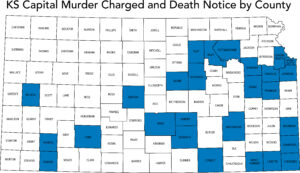On July 1st, the Kansas death penalty turned 31 years old.
KCADP board members have encountered persons who don’t even know Kansas HAS a death penalty. We hope this article might bring a broader awareness of where capital punishment has been/is being sought in our state.
What is capital murder?
Under the law, capital murder is defined as intentional premeditated murder with one or more of these factors:
- kidnapping or aggravated kidnapping for ransom;
- contract murder;
- murder of any person by an inmate in a correctional facility;
- murder of a victim of rape, criminal sodomy, or aggravated criminal sodomy in the attempt to commit, commission of, or subsequent to the crime;
- murder of a law enforcement officer;
- murders of more than one person during the same act or in two or more acts connected as part of a common scheme;
- murder of a child under the age of 14 in the commission of kidnapping or when the kidnapping is done with the intent to commit an unlawful sex offense upon or with the child, or with the intent that the child commit or submit to a sex offense.
Decision point 1: charging and death notice?
When a murder happens, the prosecutor has to make a decision as to what category of murder to charge. Since 1994, at least 138 murders have been charged as capital in Kansas.
The prosecutor (district attorney or county attorney) then has a decision to make. Will they give a “death notice” in the case, which is an official document indicating that they will be asking the jury to give the death penalty if the defendant is convicted of capital murder? Or will they seek the alternative sentence provided under law?
Since July 1, 2004, if convicted of capital murder the defendant faces life without parole as the alternative sentence. Prior to that time, the max incarceration times were 25, 40, or 50 years in prison before parole eligibility. The exact “hard” sentence depended on the date of the crime.
Of the cases charged as capital since 1994, 78 cases in 27 counties have had a death notice given. The top three counties with the number of cases filed with a death notice are Sedgwick and Wyandotte (19 each), and Johnson (8).

Sometimes the prosecutor will file capital but not give a death notice. The following counties have filed a capital charge against a defendant, but did not give a death notice: Atchison, Butler, Chautauqua, Doniphan, Geary, Grant, McPherson, and Miami.


